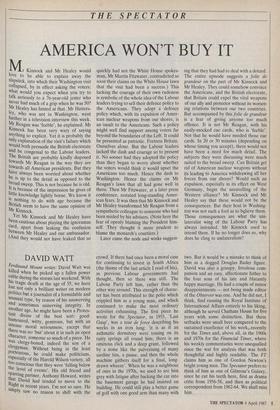DAVID WAn'
Ferdinand Mount writes: David Watt was killed when he picked up a fallen power cable during the storms last weekend. With his tragic death at the age of 55, we have lost not only a brilliant writer on modern politics but a journalist of a formidable and unusual type, by reason of his unswerving and sometimes unnerving integrity. In another age, he might have been a Protes- tant divine of the best sort: good- humoured, witty, generous, but with an intense moral seriousness, except that there was no 'but' about it in such an open character, someone so much of a piece. He was clergy-boned, indeed the son of a clergyman. Without being in the least portentous, he could make politicians, especially of the Harold Wilson variety, all too conscious that they were 'falling below the level of events'. His old friend and sparring partner, Anthony Howard, writes that David had tended to move to the Right in recent years. I'm not so sure. He simply saw no reason to shift with the crowd. If there had once been a moral case for continuing to invest in South Africa (the theme of the last article I read of his), as previous Labour governments had thought, then so there was still. The Labour Party left him, rather than the other way around. This strength of charac- ter has been attributed to the polio which crippled him as a young man, and which continued to make the most ordinary activities exhausting. The first piece he wrote for the Spectator, in 1955, 'Last Gasp', was a tour de force describing his weeks in an iron lung: 'it is as if an asthmatic dormitory were tossing on its rusty springs all round him; there is an ominous. click and a deep grunt, followed by a noise like the pulverising of many sardine tins, a pause, and then the whole machine gathers itself for a final, long- drawn wheeze'. When he was a neighbour of ours in the 1970s, we used to see him grey with fatigue after backing the car into the basement garage he had insisted on building. He could still play a better game of golf with one good arm than many with two. But it would be a mistake to think of him as a dogged Douglas Bader figure. David was also a gossipy, frivolous com- panion and an easy, affectionate father to the four sons of his late and blatantly happy marriage. He had a couple of minor disappointments — not being made editor of the Observer was one. And he did not, I think, find running the Royal Institute of International Affairs entirely to his liking, although he served Chatham House for five years with some distinction. But these setbacks were small beer compared to the sustained excellence of his work,. recently for the Times and, above all, in the 1960s and 1970s for the Financial Times, where his weekly commentaries were unequalled since the war for analysis that was both thoughtful and highly readable. The FT claims him as one of Gordon Newton's bright young men. The Spectator prefers to think of him as one of Gilmour's Galaxy, since he cut his teeth here, first as drama critic from 1956-58, and then as political correspondent from 1962-64. We shall miss him.


























































 Previous page
Previous page